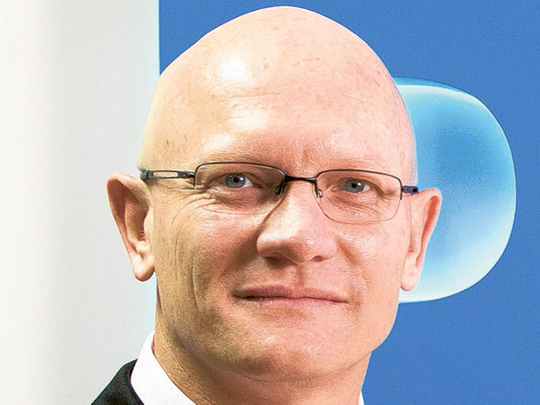
Dubai Dell is shedding its tag of just being a computer manufacturer and is going on an acquisition spree to deliver end-to-end solutions and infrastructure capabilities.
The US company is close to acquiring 21 firms in the last six years and has acquired 14 businesses in the last two years.
"In order to capture the fast growing Middle East IT market, Dell wants to create synergies between its PC, server and storage segments with its services offering. So it is no more a PC company. It is an end-to-end IT solutions company which understands the needs of its customers," Dave Brooke, general manager of Dell Middle East, told Gulf News.
Connectivity is becoming a challenge, he said as the usage of IT has been seeing a massive change. Today, one person uses four devices — PC, laptop, smartphone and tablet.
Today, IT has become an important aspect to customers for conducting their businesses. There is only a thin line between the IT organisation and business. Customers decide on "choice of technology and where it should be, whether within the premise or in cloud," he said. This transformation has started in Dell in the past few years.
Dell's strategy is to help commercial and public sector customers "seamlessly transition from legacy IT systems to converged, open-standards-based platforms," Brooke said.
Quoting an IDC report, he said Dell is the top desktop vendor with a market share of 14.1 per cent and over 21 per cent in the laptop space in 2011.
Dell became a serious player in the services segment after it acquired Perot Systems, he said and added that Dell is still committed to its hardware segment.
"We are actively purchasing large firms to complement the overall Dell portfolio," he said.
"Our strategic view is that companies should never look for proprietary based solutions. They will be locked with them for years. They should be open. Dell's strategy is to keep it open, make it affordable and flexible. Customers should be able to buy from Dell and at the same time from others in computing standards."
Dell is investing both organically and inorganically to expand in the cloud sector.
He said acquiring tech-security company SonicWall will allow Dell to play in the next-generation firewall market. Companies don't need to invest in security infrastructure. They can move it to the cloud and the specialists will take care of it. "By acquiring Wyse, we get products and services that would fill corporate customers' needs from ‘end to end' — from the data centre and cloud computing to workers' desktop computing and even mobile solutions, such as tablets and smartphones."
With a 15 per cent compound annual growth rate, market research firm IDC expects the global thin-client market to be valued around $3 billion (Dh11.01 billion) by 2015 — meaning Dell's playing in the right space in terms of growth potential. In addition, the Wyse acquisition better positions Dell to grab a piece of the fast-growing cloud-computing market, which should also help the company earn new enterprise customers.
Revenue channels
"With traditional desktops being replaced by mobile devices and tablet computers, Dell understands the need to beef up revenue channels outside its PC business. Acquisition costs will weigh on profits in the near term, but Dell is moving in the right direction."
"Dell also faces the tougher challenge of smoothly integrating these acquisitions into a unified suite of product offerings," IDC said.
The world's third-biggest computer maker has been expanding its services offering to reduce its dependence on sales of computers.
Dell wants to grow in a new direction with these acquisitions. It is clearly trying to own a different part of the post-PC infrastructure — the data centre. It is busy revamping itself into an enterprise hardware company that rivals the likes of HP and IBM.
Regarding cloud computing, he said it offers companies an IT system that has greater flexibility and at the same time is far less expensive than conventional systems. "There are many ways you can protect your IT environment and cloud computing provides the same security as any other software system," he said.
Massive market
"Cloud computing is a massive growth market, particularly in the Middle East. We need to get the message over that our customers can trust the integrity of the system," he said.
There's no denying that the move to cloud services is coming and the channel needs to be prepared to support this. But he said it is also important to consider the speed at which the changes are occurring and adapt accordingly.
Traditionally, he said the industry has sold companies new products every three years that are basically the same thing in different wrappers. There is no reason why companies cannot use cloud computing on their existing equipment and have more flexibility.
Dell, which ditched its previous attempt at cracking the global tablet market with Streak, is planning a fresh assault with the advent of Microsoft's new Windows 8 operating platform, which is expected later this year and will have a touch interface that works across desktop computers, tablets and smartphones.
"We're very encouraged by the touch capability we are seeing in the beta versions of Windows 8. Tablet will be one of the devices in our portfolio. We will remain a player in every space whether in Windows or Android space," he said.
"We have a roadmap for tablets that we haven't announced yet. You'll see some announcements."












